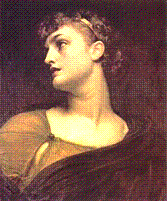
|
LITR 4533: |
|
|
Genre Presentation 2006 |
Tuesday, 13 June: private & public woman: Sophocles, Antigone
Discussion-starter: Topher Gregory

A
painting of Antigone by Frederic Leighton
Picture: http://en.wikipedia.org/wiki/Image:Antigoneleigh.jpg
Theme: The issue of gender. First, Antigone’s defiance of Kreon, the king, by honoring her traitor brother, Polyneices, with a burial. Later, dialogue surrounding gender will be discussed.
Spectacle:
· the off-stage deaths of Megareus, Eteocles, Polyneices, Antigone, Haimon, and Queen Eurydice.
· the tales the Messenger tells to Queen Eurydice.
Evaluating the theme:
·a. Sophocles
presents a play that confronts gender issues, beginning with Antigone’s
powerful speech style.
page 114:
“Kreon: ‘Her mine mind’s a traitor:
crimes kept in the dark
Cry for light, and the guardian brain
shudders;
But how much worse than this
Is brazen boasting or barefaced anarchy!’
Antigone: ‘Kreon, what more do you want than my death?’ “
·b. Also, the
dialogue amongst the play’s characters reflects the perception of gender and
each gender’s position in society.
page 112:
“Sentry: ‘The dead man –
Poyneices –
Out there –
Someone, –
New dust on the slimy flesh!
Someone has given it burial that way, and
gone…’
Kreon: ‘And the man who dared do this?’ “
(And later Kreon’s
shocked when he finds out from the Sentry during Scene 2 it is not a man, but
Antigone, a woman.)
Characteristic of Tragedy:
·the death of Antigone even after Teiresias convinces Kreon to hatch up a surprisingly simple plan to undo what he has done during the play. Kreon in a romance or comedy would have saved Antigone and given Polyneices a proper burial.
Tragic Ending:
·Antigone ends with the deaths of Antigone, Haimon, and Queen Eurydice.
·Justice is restored in the end in Antigone because of Kreon’s development as a character, however unsuccessful his attempts were at saving Antigone.
·the death of the tragic heroine comes into play at the conclusion when Antigone dies
Questions:
- In
what way is the character Antigone similar to her father Oedipus, as
proposed by the Choragos (Scene II, line 74)?
- What if the play was about the crime committed by Antigone – but instead, the crime were committed by a new, unrelated, male person? What differences, aside from gender issues would there now be?
